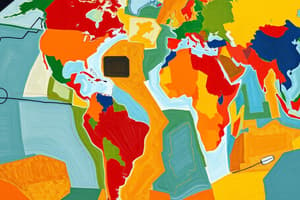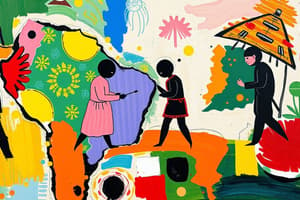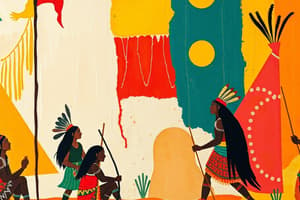Podcast
Questions and Answers
What was the primary reason for European exploration during the 15th and 16th centuries?
What was the primary reason for European exploration during the 15th and 16th centuries?
- To escape religious persecution
- To spread democracy to other regions
- To find new trade routes to Asia (correct)
- To establish colonies in Africa
Which countries were the leaders in European exploration?
Which countries were the leaders in European exploration?
- Portugal and Spain (correct)
- France and Spain
- Netherlands and Sweden
- Italy and England
What did Africa contribute to the Afro-Eurasian trade network?
What did Africa contribute to the Afro-Eurasian trade network?
- Spices and silk
- Gold and ivory (correct)
- Textiles and timber
- Ceramics and glassware
Which ship design significantly improved navigation in the Atlantic Ocean for explorers?
Which ship design significantly improved navigation in the Atlantic Ocean for explorers?
Why was the presence of the Ottoman Turks considered controversial for Europeans?
Why was the presence of the Ottoman Turks considered controversial for Europeans?
What percentage of the native population died because of European disease?
What percentage of the native population died because of European disease?
What animal had the biggest impact on the western hemisphere once it was trained and used by natives?
What animal had the biggest impact on the western hemisphere once it was trained and used by natives?
What crop was said to lay the foundation for the Industrial Revolution?
What crop was said to lay the foundation for the Industrial Revolution?
What diseases were introduced by the Europeans?
What diseases were introduced by the Europeans?
Why were natives so vulnerable to European diseases?
Why were natives so vulnerable to European diseases?
What was one of the primary motivations for European exploration during the 15th to 17th centuries?
What was one of the primary motivations for European exploration during the 15th to 17th centuries?
Which two countries were the leaders in European exploration?
Which two countries were the leaders in European exploration?
What did Portuguese explorers aim to establish in the Indian Ocean?
What did Portuguese explorers aim to establish in the Indian Ocean?
What goods were Africans primarily supplying in the Afro-Eurasian trade during the era of exploration?
What goods were Africans primarily supplying in the Afro-Eurasian trade during the era of exploration?
Which empire was a significant military threat to Christian Europe during the exploration period?
Which empire was a significant military threat to Christian Europe during the exploration period?
What type of sailing ship was significant during the Age of Exploration?
What type of sailing ship was significant during the Age of Exploration?
What major event is associated with the year 1492?
What major event is associated with the year 1492?
Which disease was notably responsible for high mortality rates during the Columbian Exchange?
Which disease was notably responsible for high mortality rates during the Columbian Exchange?
What percentage is often associated with historical impacts of disease on indigenous populations?
What percentage is often associated with historical impacts of disease on indigenous populations?
Which Spanish conquistador is known for his role in the fall of the Aztec Empire?
Which Spanish conquistador is known for his role in the fall of the Aztec Empire?
What was a major factor contributing to the lack of immunity in indigenous populations?
What was a major factor contributing to the lack of immunity in indigenous populations?
Which animals were used as 'Beasts of Burden' during the Columbian Exchange?
Which animals were used as 'Beasts of Burden' during the Columbian Exchange?
What was one of the main crops exchanged from the Americas to Europe?
What was one of the main crops exchanged from the Americas to Europe?
Flashcards are hidden until you start studying
Study Notes
European Exploration and the Columbian Exchange
- The period between the 15th and 17th centuries is regarded as the Age of European Exploration, marked by significant advancements in navigation and a thirst for new trade routes and resources.
- This period saw the rise of powerful nations like Spain and Portugal, fueled by the desire to break the Venetian and Ottoman control on trade routes with Asia.
- Prior to European exploration, the center of the world trade network was the Indian Ocean region, dominated by Muslim empires like the Ottoman Empire, and maritime city-states like Venice.
- European nations, primarily Portugal and Spain, were keen to establish direct sea routes to Asia, bypassing the Ottoman Empire's control over the Mediterranean and the Middle East land routes.
- The discovery of the New World, primarily through voyages by Christopher Columbus, ushered in the Columbian Exchange—a vast exchange of plants, animals, diseases, and culture between the Old World (Europe, Asia, and Africa) and the New World (the Americas).
- The introduction of European diseases, including smallpox, measles, and influenza, decimated native populations in the Americas, leading to a significant population decline.
- The Columbian Exchange also saw the transfer of crops like corn, potatoes, and tomatoes from the Americas to Europe, significantly impacting European diets and agriculture. The introduction of horses by the Europeans also had a major impact on native American cultures.
- The Columbian Exchange also facilitated the Transatlantic slave trade triangle, with African slaves being transported to the Americas to fill labor needs on plantations, contributing to the development of the Americas' economies.
- The Columbian Exchange represents a turning point in global history, with profound and lasting effects on the world's demographics, economies, and cultures.
Studying That Suits You
Use AI to generate personalized quizzes and flashcards to suit your learning preferences.




